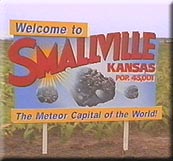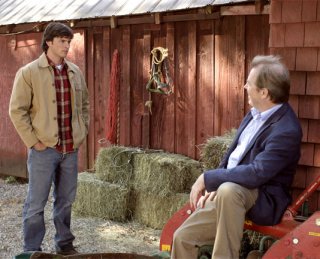Smallville
Perry
original airdate: 10-29-03
Dear readers,
I apologize. It would seem I used up all my outrage last week
and cannot muster up much to say about this latest entry in
the Smallville season.
Which
is a shame, as it should have been an episode chock full of
gleeful fanboy delights, introducing Perry White to future
charge Clark Kent and unlocking the special effect of the
Earth's yellow sun on the young Kryptonian. And yet, it was
dull as dishwater, despite Michael McKean's best efforts to
drink up screen time as washed-up rummy White.
After
a tangle with Lionel Luthor (conspicuously absent and always
missed), the once-Pulitzer-caliber journalist has fallen on
hard times, his investigative story buried by powerful lawyers
and his career at the bottom of a bottle. It's by no means
a stretch for McKean, a man who arguably knows better than
to lock himself into a recurring role; Perry is a run of the
mill, insecure blowhard who wants nothing but the truth. The
character has nothing new to bring to the party except to
pacify the fanboy contingent. Sort of like Pete, really.
He comes
to town looking for a story on Lana, queen of the meteor shower,
but ends up setting his sights on Clark after he's witnessed
rogue displays of super-strength, superspeed and invulnerability.
Ordinarily, one assumes Clark is not so careless about such
things, but Perry is, after all, an unreliable drunk, and
a timely solar flare has wreaked some havoc on the earth-bound
Krypto-physiology.
Of course,
no one believes Perry, not even Perry himself by the end,
when Clark, powerless, calls on Pete and Lana to save them
from certain death. Seriously, that's way too many times for
Clark to dodge this bullet of being discovered. Way too many
convenient deaths, drunks, and disbelieving people. Clark
needs to learn how to deal with this issue without a deus
ex machina device.
Oops.
I guess I had a little bit of outrage there after all.
Lex agrees
to intense therapy after throttling Perry in a bar, but it's
a rather tame way to open the younger Luthor's eyes to his
problems. Why something so mundane, instead of something we've
seen Clark, Jonathan and hell, even Lana do several times
without inferring that they're in need of therapy? (At least,
this kind of therapy.)
Clark's
mishaps with his powers lend a few moments of amusement, and
although I wonder if I wouldn't have enjoyed more had this
been the true focus of the hour (like in Heat), I recognize
that it would have been a weaker hour. A more interesting
secondary plot, like the one in Leech, would have been
ideal for further exploration of Clark's powers as they relate
to his identity and sense of self - a story infinitely more
worthy of telling.
In the
end, it was almost a relief that so little happened because
at least nothing happened that I will have to remember to
be infuriated about later.
|







